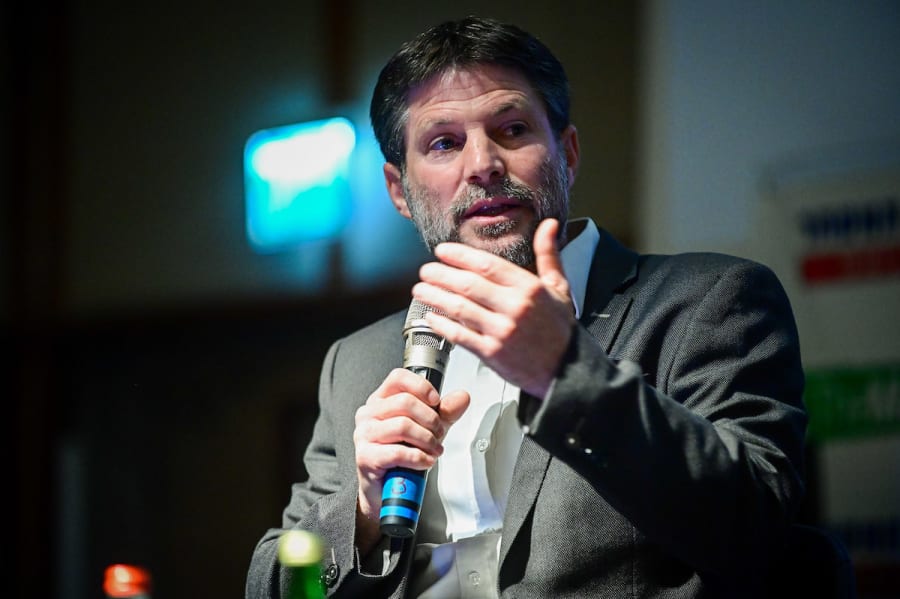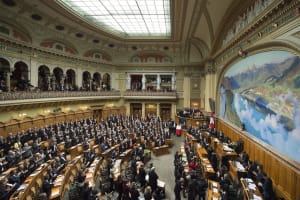Extremist Smotrich remakes his image to a moderate

It took a while to understand about whom I was reading, because the man being described by Jerusalem Post writer Zvika Klein was not the person we’ve all come to know ever since he became Israel’s Finance Minister this past December.
Bezalel Smotrich, leader of the Religious Zionism party, in addition to being finance minister, has become well-known for his extreme ideological positions, which have often labeled him a racist. As a settler who grew up in Beit El, and who now lives in the West Bank city of Kedumim, his own home, situated outside of the settlement, was illegally built.
Smotrich was in his 20s when the disengagement from Gaza occurred, and it was then that he was arrested on suspicion of attempting to blow up Israel’s major highway, the Ayalon. Refusing to speak for the three weeks he was held, no formal charges were ever brought against him.
Finding himself embroiled twice, in great controversy, he had to backtrack from his inflammatory remarks when, back in March, he stated that “Israel should ‘wipe out’ the Palestinian town of Huwara.” Later, he again got into trouble for his ill-advised comment that “there is no such thing as a Palestinian people,” a remark best not voiced by a senior government minister. As a result, he found himself unwelcomed by heads of state both in the United States and Europe.
Apparently, that was the old extremist Bezalel Smotrich who now says that his comments were misunderstood. The new and improved version is attempting to present a much more moderate, tolerant and reasonable representative of the people.
Admitting that he used “wrong terminology” when speaking about the village of Huwara, he says that “the idea to ‘erase’ never crossed his mind and apologizes if anyone interpreted it that way.” In short, we shouldn’t have ever taken his words literally. To do so only “harps on this mistake, causing harm to the government by distorting what actually happened.”
It was during this interview, a sort of time to reflect, that we were introduced to the man who feels that he’s gotten a bum rap as it relates to his image. Ironically, he “expressed concern about the rising intensity of discourse within Israeli society and highlighted the role played by certain elements that aim to exacerbate polarization.”
Of course, he doesn’t include himself as a catalyst for the polarization, despite his previously mentioned “over-the-top comments.” Instead, he points to “media sensationalism and social network dynamics,” taking no ownership of his role in any of it.
To the contrary, he stated, “It is possible to disagree without resorting to hatred or animosity,” and then began to illustrate the point by referring to his own family, who he claims are a mixture of “religious, secular, urban and settlers.” While Smotrich admits to arguments, he assures everyone that there is no animosity among them. Each respects the other, allowing for their diverse lifestyles and choices.
It is from this perspective that Smotrich reminds us of the varying cultures and values that are represented in Israel, and the reason why he, along with his other coalition members, must do their best to promote “harmony and seek common ground through agreements and compromises.” He emphasizes this point by assuring us it’s not about what he wants. In fact, he acknowledges that each opinion must be taken into consideration and not disregarded.
Although he describes himself as someone who “strives to make space for everyone and respect them,” there are many who would say that his own incendiary words contradict such a claim. At least the residents of Huwara would likely take issue with the “make space for everyone” assertion.
He laments that the impediment to finding agreement is the lack of “genuine partners,” placing the chairman of the National Unity party, Benny Gantz, among them.
But Smotrich, as the empathizer, believes that he understands the angst felt by those who are in direct opposition to the proposed reforms. After all, he can relate, as he recalls the summer of 2005, saying, “Some now understand how I felt during the Gush Katif evacuation. It was the indifference and the fiendish delight,” apparently a reference to those he believes supported it.
However, as I recall that period, most Israelis found no joy in those who were displaced from their community, albeit not by a left-wing government but by then-Prime Minister Ariel Sharon, known for his bullish right-wing positions. So, it’s difficult to understand how Smotrich pits one side against the other, because his beef, back then, would have been with his own side.
As the interview resumes, Smotrich seeks to “reassure” the public that he, as well as the other coalition members, are very different from how they are perceived.
In fact, he speaks of an epiphany that he had back in March when Prime Minister Benjamin Netanyahu put the brakes on the proposed judicial reform bills. Although he feels it was a wrong move, he says it was then that he began to meet with hundreds of people who represented different segments of Israeli society, including business people, realtors, economists and those who worked in high-tech. From these hookups, he realized that “people are hurting,” and it made him come to the realization that compromise is needed so that common ground can be found.
Who would’ve thought that Bezalel Smotrich was so reasonable? It makes us all realize just how silly we were to think otherwise.
But, let’s not get ahead of ourselves. Smotrich doesn’t hold back from differentiating “the good people of Israel” from those who are the extremist elements, causing all the harm and disruption. Unfortunately, we don’t know if those extremist elements to which he is referring are all those who have taken part in the 9-month-long judicial reform protests. Nor will we, because Smotrich cannot risk his new and improved image by calling so many fellow citizens bad apples.
The Smotrich interview is very reminiscent of those visual puzzles that we see now and again. The challenge is to find the tiny spider buried in a crowded field of flowers. Likewise, if you look carefully for the hints of “the real Smotrich,” within this interview, his true, extreme ideologies are there, leaving no room for anyone to think that he has become a more trusted moderate.
Smotrich’s image has already been set, and it’s too late to bury it and recreate a new one that will better blend into the otherwise diverse population of Israel.
But if you’re still looking for the not-so-subtle hints, check out the bold and italicized phrases interspersed in this article, because they are telltale of Smotrich, the extremist.

A former Jerusalem elementary and middle-school principal who made Aliyah in 1993 and became a member of Kibbutz Reim but now lives in the center of the country with her husband. She is the author of Mistake-Proof Parenting, based on the principles from the book of Proverbs - available on Amazon.













